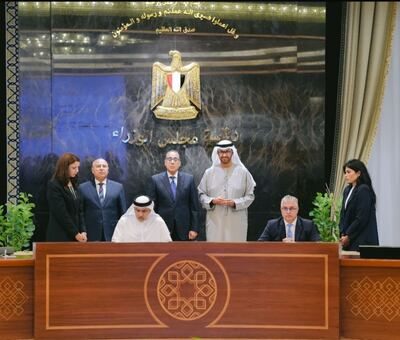The UAE and Egypt have signed preliminary agreements to develop several large-scale renewable energy projects in the North African country as they deepen their economic ties.
The agreements, signed by Egyptian and Emirati officials, include two plants to produce solar cells and solar panels, each with a capacity of 2 gigawatts, the UAE Ministry of Industry and Advanced Technology said on Thursday.
The two countries will explore setting up a battery energy storage centre with an initial capacity of 2 gigawatts.
The UAE and Egypt are also considering building three solar power plants in the North African country.
These include a 900-megawatt plant in Dakhla Oasis in the Western Desert, a 300-megawatt plant in Benban in Aswan Governorate, a 3-gigawatt floating plant on Lake Nasser, and a 2-gigawatt plant in Naga Hammadi in Upper Egypt.
All the plants will have energy storage systems, the ministry said.

Also on Thursday, the UAE and Egypt signed an agreement to develop a 20 square kilometre industrial zone in East Port Said. It will attract investments in renewable energy, manufacturing, and advanced technologies, and is expected to help Egypt's economic growth.
The East Port Said Industrial Zone benefits from a strategic location that enhances access to global markets, making it well-positioned to attract high-quality investments, Dr Sultan Al Jaber, the UAE’s Minister of Industry and Advanced Technology, said.
“The agreements aim to establish industrial projects for renewable energy generation in Egypt, grounded in strategic and economic foundations,” Dr Al Jaber said.
The Egyptian government, faced with high debt levels and inflation, has been implementing economic reforms and seeking international support to stabilise the economy and stimulate growth.
The Arab world’s third-largest economy has become a key destination for investment from Gulf countries, particularly the UAE and Saudi Arabia.
The Emirates, through its sovereign wealth fund ADQ, is investing $35 billion in Egypt, mainly to develop the coastal city of Ras Al Hekma.
In September, Saudi Crown Prince Mohammed bin Salman directed his country's sovereign wealth fund – the Public Investment Fund – to invest $5 billion in Egypt.
Egypt said at the time that the $5 billion injection would be the “first phase” of Saudi investments through the PIF.
The investments come as Egypt is looking to increase solar, wind and green hydrogen projects as it struggles with declining natural gas production. The country aims to increase power generation from renewables to 42 per cent by 2035, from 11 per cent in July this year.
“The first phase [of the projects] is scheduled to start operating and connect to the unified grid in July 2025, while the rest of the projects will be completed during the same year,” said Mahmoud Esmat, Minister of Electricity and Renewable Energy in Egypt.
“It’s set to increase the capacity of new and renewable energies, reduce reliance on fossil fuels, and limit carbon emissions.”

